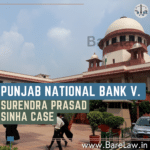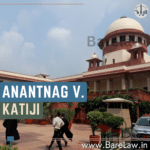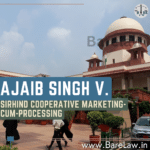
Table of Contents
Jumma Masjid, Mercara v. Kodimaniandra Deviah (AIR 1962 SC 847) | BareLaw
Background
A landmark judgement by the Supreme Court of India in Jumma Masjid, Mercara v. Kodimaniandra Deviah (AIR 1962 SC 847) decided upon the intricate aspects of Transfer of Property Act, 1882 (TOPA), particularly Section 43 and its interrelation with Spes Successionis under Section 6(a) of the same Act.
Case Overview
Family Background and Property Dispute: The subjects in the case were a joint family comprising three brothers (B1, B2, and B3), their sister (S), her two children, and three grandsons (G1, G2, G3). Upon demise of B2 and B3, their widows inherited all family properties. As heirs under Spes Successionis, grandsons executed sale deeds in favor of Ganapathi(T) assuming that they owned them.
Legal Actions and Claims: Eventually W1 filled a suit against the grandsons since she still had ownership rights over all such property. W1 won the suit but it was held that transfer to Ganapathi was valid under section 43 TOPA. After W1’s death the property devolved on grandsons. Jumma Masjid,Mercara then claimed that he got it through gift from W1 and release deed from B1.
Legal Issues and Analysis
Section 43 TOPA and Spes Successionis: The honourable Supreme Court examined whether a transfer by a person holding spes successionis is protected by Section 43 of TOPA. This section relates to transfer by someone who does not have title at time of transfer but acquires one later on.
Supreme Court’s Ruling: Moreover Apex Courtheld that if one transfers a property claiming that he has an interest in present although his actual interest is only spes successionis then section 43 applies. Thus, the court upheld Ganapathi’s title and concluded that transfer to him was valid since he had gone on the faith of the grandsons’ representation and paid consideration for it.
The judgment in Jumma Masjid, Mercara v. Kodimaniandra Deviah is important for interpreting Indian property law. By interpreting Section 43 of TOPA with a view to balancing the interests of both parties in a transaction where transferor acquires title post-transfer this case has provided much-needed clarity.
Summary
The Supreme Court of India’s ruling in Jumma Masjid, Mercara v. Kodimaniandra Deviah (AIR 1962 SC 847) has an important bearing on understanding Transfer of Property Act, 1882 particularly as regards Section 43 and Spes Successionis. It set out principles of estoppel in property transfers thus establishing a precedent that other courts can follow when faced with similar legal problems.





